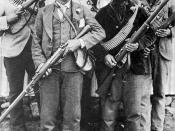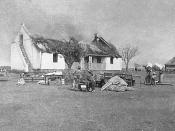The Boer War was fought in South Africa during 1901 between Great Britain and Dutch settlers called Boers. The Boer War was a Colonial conflict. The Boers possessed large amounts of South Africa, and the British were fighting the Boers for this land. The British army sentenced Lt. Morant, who was an officer in the British army, to death for the execution of some Boer prisoners. The court decision to put Lt. Morant to death was unjust according to Just War Theory (JWT), while according to the ethical principal of Utilitarianism the court decision was completely just.
Utilitarianism is the ethical theory that argues that we as a society ought to do what makes the greatest happiness for the greatest number of people. The two types of Utilitarianism are Act Utilitarianism and Rule Utilitarianism. Act Utilitarianism claims that the moral worth of an action is determined by the good and bad consequences it produces.
By this account, an act is morally right only if it produces more good than any other alternative action could have. Rule Utilitarianism says that acts are right if and only if they are in accordance with rules that, if followed universally, would produce better consequences than any alternative rules.
In the case of the court decision concerning Lt. Morant we will focus only on Rule Utilitarianism. Lord Kichen, who was a high ranking official in the British army, was trying to do the greatest good for the greatest number of people when he constructed the seemingly unfair trial against Lt. Morant. Lord Kichen?s intent was to find Lt. Morant guilty of murdering Boer prisoners. By finding Lt. Morant guilty Lord Kichen intended to show the Dutch how impartial the British were at Lt. Morants expense. Lord Kichen specifically said, ? sacrifices must be...


